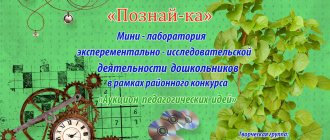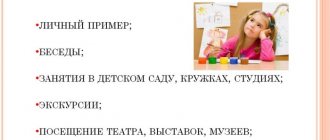Educational event as a form of joint cognitive creative activity
Educational event as a form of joint cognitive creative activity
“Community of events is a necessary situation for human development.” IN AND. Slobodchikov.
Eventfulness is a property of open and free education, which is structured differently than a traditional school and lives by different standards.
Educational events are aimed at developing certain skills that help to master the spaces of the unknown. The event has the function of accompanying a person in the designated topic, living and experiencing it, “passing through oneself”, when the previous boundaries of ideas about oneself are felt and new ones are groped.
The event-based approach to personality development is one of the promising areas being developed in Russian psychology and pedagogy. The idea of the event approach was borrowed from the pedagogical system of A. S. Makarenko, who noted that bright and exciting events are of great importance in a person’s life. The theoretical construction of the essence of the event begins with an analysis of the works of B.D. Elkonin, in his opinion, “An act of development and an event are synonymous. An event is a special transitional form of life.”
Based on the analysis of psychological and pedagogical literature, we can conclude that an educational event is a source of development for its participants, since it unfolds as a person overcoming certain boundaries: practical, associated with the implementation of new actions and mastering new ways of activity, and theoretical, aimed at enriching mental structures.
The essence of an educational event is that special conditions are organized for children’s actions, as a result of which the child creates a certain product; then - strengthening this action through reflection. Thus, the experience gained, meaningful and conscious, turns into a means to achieve a new, higher goal.
An event as a didactic unit has in its structure the following components: – organizational (how a potential educational event is structured); – pedagogical (how a teacher works); – resultant (what happens to a person who is specially included in a potential educational event).
In the work of M.S. Averkova, S.V. Ermakova and A.A. Popov identified the following types of educational events:
Design
– a form of event associated with the cycle of organization and implementation of intention. The result of design is a form of design thinking, which is mastered by the student as a means of organizing activities, and the integrity of the thinking of the team that developed and organized the joint project.
Education
– a form of event, the basic process of which is the development and modeling of cultural content. The content unit of learning is the academic subject as a system of knowledge synthesis. The result of the event is the knowledge and skills of students.
Training
– a form of event aimed at mastering self-organization strategies through performing tasks on test bodies and simulators. The educational task of the training, on the one hand, is to master the form and method of carrying out a specific action. On the other hand, the formation of a new sense of well-being in relation to the activity being mastered. The result of the training event is competence.
Organizational activity game
– a form of event based on problematization and construction. The main content is working with the framework of thinking. The educational task is to construct and determine the true (for oneself, here and now) picture of the world. The new development here is the expansion of reflexive capabilities.
The following stages of preparing an educational event can be distinguished:
Stage 1 – determining the topics of educational events.
Stage 2 – determining the goals and objectives of the upcoming educational event, planning the stages of preparation.
Ideally, joint activities between the teacher and students should be organized here, but in practice this does not always work out that way. Therefore, the teacher himself determines the goals and objectives of the educational event. If several teachers participate in this event, then they organize this activity jointly.
The goals of organized educational activities of different content and form, traditional and non-traditional, are being determined. The teacher determines what additional resources he needs to conduct an educational event (joint activities with other teachers, parents, the funds necessary to conduct the event are determined.
Stage 3 – preparation for the educational event. In the process of preparing for the educational event, creative workshops are held, children are given special tasks, children prepare creative works, and thematic materials are viewed.
Stage 4 – holding an educational event, the most wonderful and long-awaited moment of action. Mandatory criteria for preparing an educational event: A special location for the event, creative play action, unexpectedness and surprise.
Stage 5 – reflection, the effect of participation in an educational event.
Now let’s take a closer look at the technology for holding an educational event.
Designing an educational event begins with developing its concept. In an educational event, a topic is modeled by a group of people; this is a specific area of activity for ultimate analysis and rethinking. It is necessary to think through the potential participants of the event, the issues and creative name of the event, the model of co-organization of activities, and technological tools.
There are a number of fundamental points in organizing an educational event:
1. The task set for the child should not only be practice-oriented, but also creative: to do something that no one has done before!
2. Each participant not only creates a product, but also conducts its presentation.
3. The competitive mode (it is mandatory) involves not only open evaluation criteria, but also several stages of positional examination (from the perspective of the child, parent, teacher...)
4. Groups of participants are mixed (different classes, different ages), and the rating is not only group, but also individual.
Tutor support is provided for all methods of activity, and with the completion of the event it not only does not end, but continues - with reflection, organization of communication between participants, and integration of them into further educational programs.
The start of an educational event begins with the co-organization of interaction with potential participants. To do this, it is necessary to create a situation that causes events: situations of searching for answers to various questions, situations of surprise and novelty of knowledge, situations of understanding one’s own educational needs, situations of social initiative and responsibility, and others. The task and mode of the educational event are fundamentally “underdetermined” in nature, leaving room for the subjective behavior of the participants. Extremeness is set and maintained due to not only the content, but also the format: groups of participants of different ages, collected from different cities and schools or classes, the inclusion of unfamiliar adults, special venues, a special daily schedule, the use of unfamiliar information technologies or gadgets. At the start, it is important for teachers not only to create a space for joint activities, but also to stimulate the desires and readiness of students for joint activities.
The implementation of the educational event is carried out in accordance with the plan with prolonged support of students by teachers in order to create a space of opportunities for solving the problem and maintaining cognitive activity. At the same time, the teacher should not influence the development of the event; it should happen on its own. The educational event unfolds as a testing space.
The educational event ends with reflection on the acquired experience of activity, one’s own deficits in knowledge and methods of action, as well as the determination of further steps in the educational movement.
Educational events at school:
- “Oh, sports! You are the world!
- “We keep the memory in everyone’s heart!”
- “We need different mothers! All kinds of mothers are important!”
- "Virtual journey around planet Earth"
- “The history of the city is the history of my school” for the school’s anniversary
- "City of masters"
- "Learn to be healthy!"
Educational event “Learn to be healthy!”
Preparatory work: creating pedagogical workshops or creative platforms, collecting material, developing a script, learning roles, and other organizational issues.
Content part: morning flash mob on the topic “Health is fine - thanks to exercise”, a health line, a single training lesson “Healthy Eating”, fun starts, an excursion to a thematic exhibition of drawings, application of knowledge acquired at the preparation stage, a game - a trip to the Country Health.
Educational event “We keep the memory in everyone’s heart!”
Preparatory work: collection of material, preparation of children's projects, conversations with students, parents, development of scenarios for classroom and extracurricular activities in the unified theme “75th anniversary of the Great Victory.”
Content: creation of an electronic card index “WWII Veterans”, stand design; installation of the film “Memory Lives in Everyone’s Heart!”, holding a school-wide assembly, lighting a candle of memory, conducting training sessions in a single theme “75th Anniversary of the Great Victory”, action “Immortal” regiment", laying wreaths at the monument to WWII participants.
Literature: Internet resources.



